Deck 1: The Study of Motion
Question
Question
Question
Question
Question
Question
Question
Question
Question
Question
Question
Question
Question
Question
Question
Question
Question
Question
Question
Question
Question
Question
Question
Question
Question
Question
Question
Question
Question
Question
Question
Question
Question
Question
Question
Question
Question
Question
Question
Question
Question
Question
Question
Question
Question
Question
Question
Question
Question
Question
Question
Question
Question
Question
Question
Question
Question
Question
Question
Question
Question
Question
Question
Question
Question
Question
Question
Question
Question
Question
Question
Question
Question
Question
Question
Question
Question
Question
Question
Question

Unlock Deck
Sign up to unlock the cards in this deck!
Unlock Deck
Unlock Deck
1/143
Play
Full screen (f)
Deck 1: The Study of Motion
1
The proper abbreviation for 'kilohertz' is 'kHz.'
True
2
Motion in a circle at constant speed is motion with constant velocity.
False
3
Experimenting is part of the scientific method.
True
4
The time for one complete cycle of a periodic process to take place is called the period.

Unlock Deck
Unlock for access to all 143 flashcards in this deck.
Unlock Deck
k this deck
5
The terms velocity and speed have identical meanings in physics.

Unlock Deck
Unlock for access to all 143 flashcards in this deck.
Unlock Deck
k this deck
6
If an object's speed is constant, its velocity must also be constant.

Unlock Deck
Unlock for access to all 143 flashcards in this deck.
Unlock Deck
k this deck
7
The maximum possible speed in nature is the speed of light.

Unlock Deck
Unlock for access to all 143 flashcards in this deck.
Unlock Deck
k this deck
8
The proper abbreviation for 'grams' is 'g.'

Unlock Deck
Unlock for access to all 143 flashcards in this deck.
Unlock Deck
k this deck
9
If an object's velocity is constant, its speed must also be constant.

Unlock Deck
Unlock for access to all 143 flashcards in this deck.
Unlock Deck
k this deck
10
The number of cycles of a periodic process that occur per unit time is called the period.

Unlock Deck
Unlock for access to all 143 flashcards in this deck.
Unlock Deck
k this deck
11
The period of oscillation for a signal having a frequency of 60 Hz is 60 seconds.

Unlock Deck
Unlock for access to all 143 flashcards in this deck.
Unlock Deck
k this deck
12
Uniform motion is any motion at constant speed.

Unlock Deck
Unlock for access to all 143 flashcards in this deck.
Unlock Deck
k this deck
13
The proper abbreviation for 'seconds' is 'sec.'

Unlock Deck
Unlock for access to all 143 flashcards in this deck.
Unlock Deck
k this deck
14
The second is a metric unit of measure.

Unlock Deck
Unlock for access to all 143 flashcards in this deck.
Unlock Deck
k this deck
15
Motion in a circle at constant speed is motion with constant acceleration.

Unlock Deck
Unlock for access to all 143 flashcards in this deck.
Unlock Deck
k this deck
16
The metric prefix that means one thousand is milli-.

Unlock Deck
Unlock for access to all 143 flashcards in this deck.
Unlock Deck
k this deck
17
A body at the end of a spring oscillates up and down ten times in five seconds. The period of oscillation is 2 s.

Unlock Deck
Unlock for access to all 143 flashcards in this deck.
Unlock Deck
k this deck
18
A vector quantity has only a magnitude and no direction associated with it.

Unlock Deck
Unlock for access to all 143 flashcards in this deck.
Unlock Deck
k this deck
19
There are one thousand megabytes in a gigabyte.

Unlock Deck
Unlock for access to all 143 flashcards in this deck.
Unlock Deck
k this deck
20
Twenty milliseconds is 0.020 s.

Unlock Deck
Unlock for access to all 143 flashcards in this deck.
Unlock Deck
k this deck
21
The figure shows the distance versus time graph of an object. 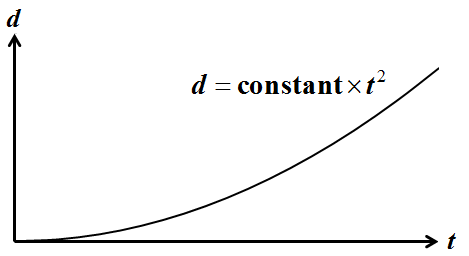
The acceleration of the moving object is a non-zero constant.

The acceleration of the moving object is a non-zero constant.

Unlock Deck
Unlock for access to all 143 flashcards in this deck.
Unlock Deck
k this deck
22
The figure shows a distance versus time graph for an object. 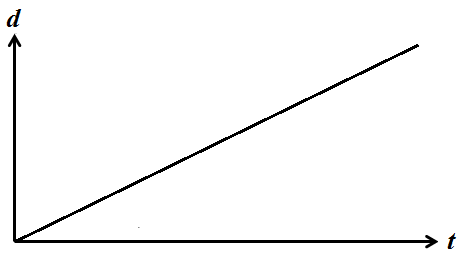
The velocity of the moving object is a non-zero constant.

The velocity of the moving object is a non-zero constant.

Unlock Deck
Unlock for access to all 143 flashcards in this deck.
Unlock Deck
k this deck
23
The slope of a distance vs. time graph is the acceleration.

Unlock Deck
Unlock for access to all 143 flashcards in this deck.
Unlock Deck
k this deck
24
The slope of a velocity vs. time graph is the acceleration.

Unlock Deck
Unlock for access to all 143 flashcards in this deck.
Unlock Deck
k this deck
25
The figure shows a distance vs. time graph of an object with three distinct regions, I, II, and III. 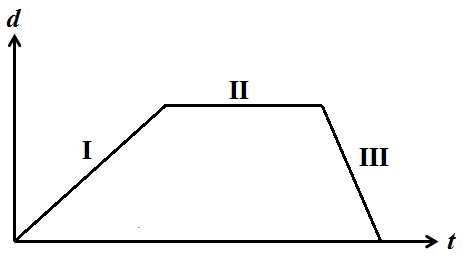
The object's velocity is zero in region II.

The object's velocity is zero in region II.

Unlock Deck
Unlock for access to all 143 flashcards in this deck.
Unlock Deck
k this deck
26
If an object's acceleration is positive, its speed must be increasing.

Unlock Deck
Unlock for access to all 143 flashcards in this deck.
Unlock Deck
k this deck
27
The figure shows a distance versus time graph for an object. 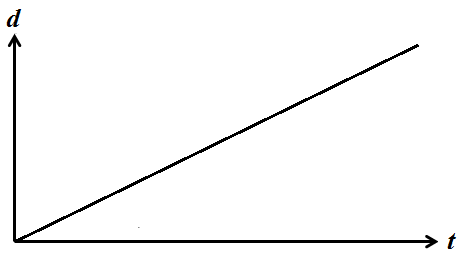
The acceleration of the moving object is a non-zero constant.

The acceleration of the moving object is a non-zero constant.

Unlock Deck
Unlock for access to all 143 flashcards in this deck.
Unlock Deck
k this deck
28
An object moving in a circle undergoes centripetal acceleration.

Unlock Deck
Unlock for access to all 143 flashcards in this deck.
Unlock Deck
k this deck
29
The figure shows a distance vs. time graph of an object with three distinct regions, I, II, and III. 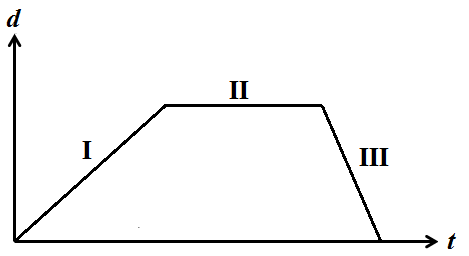
The object's acceleration is negative in region III.

The object's acceleration is negative in region III.

Unlock Deck
Unlock for access to all 143 flashcards in this deck.
Unlock Deck
k this deck
30
A fast-moving body must have a larger acceleration than a slow-moving body.

Unlock Deck
Unlock for access to all 143 flashcards in this deck.
Unlock Deck
k this deck
31
A ball thrown upwards reaches a maximum height and then comes back down to the original level.
At the peak of the motion the velocity and acceleration are both zero.
At the peak of the motion the velocity and acceleration are both zero.

Unlock Deck
Unlock for access to all 143 flashcards in this deck.
Unlock Deck
k this deck
32
A ball thrown upwards reaches a maximum height and then comes back down to the original level.
As the ball is going upwards the velocity and acceleration both point up.
As the ball is going upwards the velocity and acceleration both point up.

Unlock Deck
Unlock for access to all 143 flashcards in this deck.
Unlock Deck
k this deck
33
The figure shows the distance versus time graph of an object. 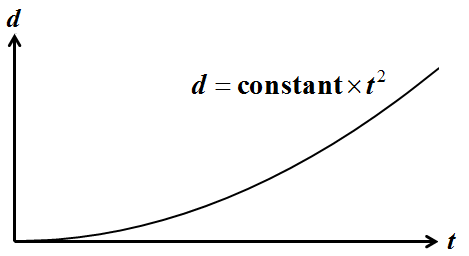
The velocity of the moving object is a non-zero constant.

The velocity of the moving object is a non-zero constant.

Unlock Deck
Unlock for access to all 143 flashcards in this deck.
Unlock Deck
k this deck
34
The figure shows a distance vs. time graph of an object with three distinct regions, I, II, and III. 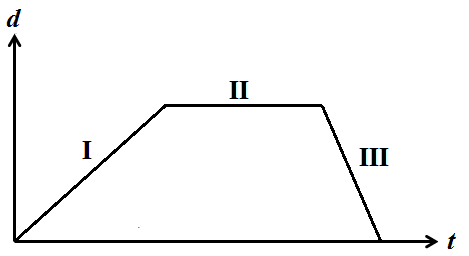
The object's acceleration is zero only in region II.

The object's acceleration is zero only in region II.

Unlock Deck
Unlock for access to all 143 flashcards in this deck.
Unlock Deck
k this deck
35
The figure shows a distance vs. time graph of an object with three distinct regions, I, II, and III. 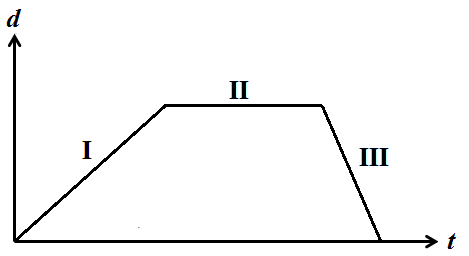
The object is never at rest.

The object is never at rest.

Unlock Deck
Unlock for access to all 143 flashcards in this deck.
Unlock Deck
k this deck
36
A ball thrown upwards reaches a maximum height and then comes back down to the original level.
As the ball is going downwards the velocity and acceleration both point down.
As the ball is going downwards the velocity and acceleration both point down.

Unlock Deck
Unlock for access to all 143 flashcards in this deck.
Unlock Deck
k this deck
37
The figure shows a distance vs. time graph of an object with three distinct regions, I, II, and III. 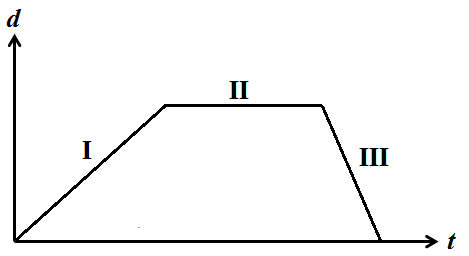
The object's velocity is never negative.

The object's velocity is never negative.

Unlock Deck
Unlock for access to all 143 flashcards in this deck.
Unlock Deck
k this deck
38
The figure shows a distance vs. time graph of an object with three distinct regions, I, II, and III. 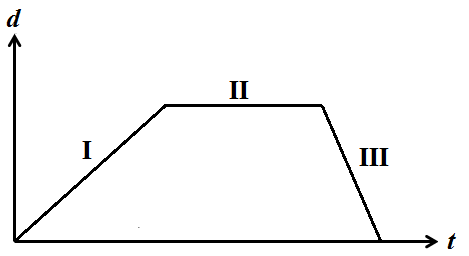
The object's velocity is positive in region II.

The object's velocity is positive in region II.

Unlock Deck
Unlock for access to all 143 flashcards in this deck.
Unlock Deck
k this deck
39
The figure shows a distance vs. time graph of an object with three distinct regions, I, II, and III. 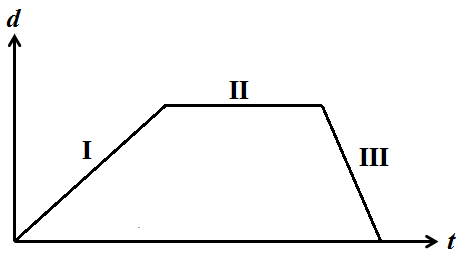
The object's speed is greatest in region I.

The object's speed is greatest in region I.

Unlock Deck
Unlock for access to all 143 flashcards in this deck.
Unlock Deck
k this deck
40
An aircraft approaches a runway that runs directly east as a strong wind blows out of the south. The direction that the aircraft should aim in order to land is east of north.

Unlock Deck
Unlock for access to all 143 flashcards in this deck.
Unlock Deck
k this deck
41
Twenty milliseconds is
A) 0.00002 s.
B) 0.0002 s.
C) 0.002 s.
D) 0.02 s.
E) 20000 s.
A) 0.00002 s.
B) 0.0002 s.
C) 0.002 s.
D) 0.02 s.
E) 20000 s.

Unlock Deck
Unlock for access to all 143 flashcards in this deck.
Unlock Deck
k this deck
42
The acceleration of a ball as it rolls down a ramp is 4 m/s2. The ball is referred to 2 s after it starts to roll.
The acceleration after starting from rest is 8 m/s2.
The acceleration after starting from rest is 8 m/s2.

Unlock Deck
Unlock for access to all 143 flashcards in this deck.
Unlock Deck
k this deck
43
How many megabytes are there in a gigabyte?
A) 10
B) 1000
C) 1000000
D) none of the above
A) 10
B) 1000
C) 1000000
D) none of the above

Unlock Deck
Unlock for access to all 143 flashcards in this deck.
Unlock Deck
k this deck
44
A racecar driver steps on the gas, and his racecar travels 20 meters in 2 seconds starting from rest. The acceleration of the racecar is 5 m/s2.

Unlock Deck
Unlock for access to all 143 flashcards in this deck.
Unlock Deck
k this deck
45
Which of these are fundamental physical quantities?
A) space, time, and matter
B) kilograms, seconds, and meters
C) length, time, and mass
D) momentum, energy, and mass
A) space, time, and matter
B) kilograms, seconds, and meters
C) length, time, and mass
D) momentum, energy, and mass

Unlock Deck
Unlock for access to all 143 flashcards in this deck.
Unlock Deck
k this deck
46
When a body moves in circular motion at constant speed the velocity and acceleration point in opposite directions.

Unlock Deck
Unlock for access to all 143 flashcards in this deck.
Unlock Deck
k this deck
47
Fifteen microseconds is
A) 0.0000015 s.
B) 0.000015 s.
C) 0.00015 s.
D) 0.015 s.
E) 15000000 s.
A) 0.0000015 s.
B) 0.000015 s.
C) 0.00015 s.
D) 0.015 s.
E) 15000000 s.

Unlock Deck
Unlock for access to all 143 flashcards in this deck.
Unlock Deck
k this deck
48
A racecar driver steps on the gas, changing his speed from 10 m/s to 30 m/s in 4 seconds. The acceleration of the racecar is 10 m/s2.

Unlock Deck
Unlock for access to all 143 flashcards in this deck.
Unlock Deck
k this deck
49
In expressions like Δ v and Δ t , Δ stands for
A) "change in".
B) "triangle".
C) a constant of proportionality.
D) a variable.
A) "change in".
B) "triangle".
C) a constant of proportionality.
D) a variable.

Unlock Deck
Unlock for access to all 143 flashcards in this deck.
Unlock Deck
k this deck
50
What is the proper abbreviation for 'kilohertz?'
A) kh
B) khz
C) Khz
D) KHz
E) kHz
A) kh
B) khz
C) Khz
D) KHz
E) kHz

Unlock Deck
Unlock for access to all 143 flashcards in this deck.
Unlock Deck
k this deck
51
The acceleration of a ball as it rolls down a ramp is 4 m/s2 . The ball is referred to 2 s after it starts to roll.
The distance from the starting point is 16 m.
The distance from the starting point is 16 m.

Unlock Deck
Unlock for access to all 143 flashcards in this deck.
Unlock Deck
k this deck
52
What is the proper abbreviation for 'seconds?'
A) sec
B) There is none. It should always be spelled out.
C) secs
D) s
E) none of the above
A) sec
B) There is none. It should always be spelled out.
C) secs
D) s
E) none of the above

Unlock Deck
Unlock for access to all 143 flashcards in this deck.
Unlock Deck
k this deck
53
The time for one complete cycle of a periodic process to take place is called
A) amplitude.
B) frequency.
C) period.
D) wavelength.
E) speed.
A) amplitude.
B) frequency.
C) period.
D) wavelength.
E) speed.

Unlock Deck
Unlock for access to all 143 flashcards in this deck.
Unlock Deck
k this deck
54
Twenty kilometers is
A) 200,000 m.
B) 20,000 m.
C) 2,000 m.
D) 200 m.
E) 0.02 m.
A) 200,000 m.
B) 20,000 m.
C) 2,000 m.
D) 200 m.
E) 0.02 m.

Unlock Deck
Unlock for access to all 143 flashcards in this deck.
Unlock Deck
k this deck
55
Which metric prefix means one thousand?
A) milli-
B) centi-
C) one-
D) kilo-
E) mega-
A) milli-
B) centi-
C) one-
D) kilo-
E) mega-

Unlock Deck
Unlock for access to all 143 flashcards in this deck.
Unlock Deck
k this deck
56
The acceleration of a ball as it rolls down a ramp is 4 m/s2. The ball is referred to 2 s after it starts to roll.
The velocity acquired after starting from rest is 8 m/s.
The velocity acquired after starting from rest is 8 m/s.

Unlock Deck
Unlock for access to all 143 flashcards in this deck.
Unlock Deck
k this deck
57
What is the proper abbreviation for 'grams?'
A) g
B) gms
C) gm
D) gr
E) kg
A) g
B) gms
C) gm
D) gr
E) kg

Unlock Deck
Unlock for access to all 143 flashcards in this deck.
Unlock Deck
k this deck
58
A racecar goes around a 200 m radius curve at a constant speed of 40 m/s. Its acceleration is 8 m/s2.

Unlock Deck
Unlock for access to all 143 flashcards in this deck.
Unlock Deck
k this deck
59
Two microcuries is
A) 200,000 Ci.
B) 0.0002 Ci.
C) 0.00002 Ci.
D) 0.000002 Ci.
E) 0.00000002 Ci.
A) 200,000 Ci.
B) 0.0002 Ci.
C) 0.00002 Ci.
D) 0.000002 Ci.
E) 0.00000002 Ci.

Unlock Deck
Unlock for access to all 143 flashcards in this deck.
Unlock Deck
k this deck
60
The number of cycles of a periodic process that occur per unit time is called
A) amplitude.
B) frequency.
C) period.
D) wavelength.
E) speed.
A) amplitude.
B) frequency.
C) period.
D) wavelength.
E) speed.

Unlock Deck
Unlock for access to all 143 flashcards in this deck.
Unlock Deck
k this deck
61
The figure shows a distance vs. time graph of an object with three distinct regions, I, II, and III. 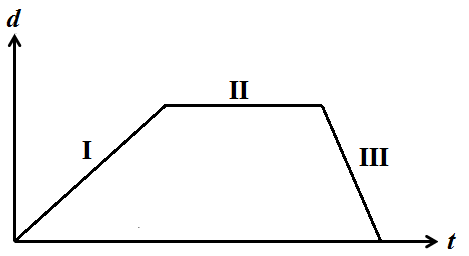 The object's velocity is zero in region(s)
The object's velocity is zero in region(s)
A) I.
B) II.
C) III.
D) no regions
 The object's velocity is zero in region(s)
The object's velocity is zero in region(s)A) I.
B) II.
C) III.
D) no regions

Unlock Deck
Unlock for access to all 143 flashcards in this deck.
Unlock Deck
k this deck
62
The slope of a distance vs. time graph is the
A) distance.
B) velocity.
C) acceleration.
D) none of the above.
A) distance.
B) velocity.
C) acceleration.
D) none of the above.

Unlock Deck
Unlock for access to all 143 flashcards in this deck.
Unlock Deck
k this deck
63
An aircraft approaches a runway that runs directly east as a strong wind blows out of the south. The direction that the aircraft should point in order to land on the runway is
A) north.
B) east of north.
C) east.
D) south of east.
E) south.
A) north.
B) east of north.
C) east.
D) south of east.
E) south.

Unlock Deck
Unlock for access to all 143 flashcards in this deck.
Unlock Deck
k this deck
64
The figure shows a distance versus time graph for an object. 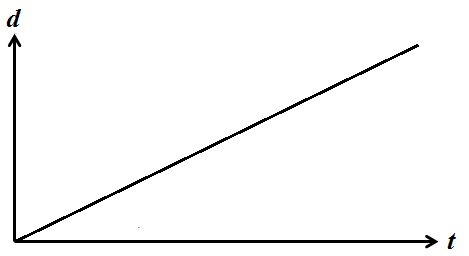 The velocity of the moving object is
The velocity of the moving object is
A) zero.
B) constant.
C) increasing.
D) decreasing.
E) not determinable.
 The velocity of the moving object is
The velocity of the moving object isA) zero.
B) constant.
C) increasing.
D) decreasing.
E) not determinable.

Unlock Deck
Unlock for access to all 143 flashcards in this deck.
Unlock Deck
k this deck
65
An object moving in a circle undergoes
A) constant acceleration.
B) free fall.
C) centripetal acceleration.
D) linear acceleration.
E) frequency.
A) constant acceleration.
B) free fall.
C) centripetal acceleration.
D) linear acceleration.
E) frequency.

Unlock Deck
Unlock for access to all 143 flashcards in this deck.
Unlock Deck
k this deck
66
If the velocity of an object is negative,
A) its speed is decreasing.
B) its velocity does not exist.
C) it is reversing direction.
D) it is moving in the direction labeled negative.
A) its speed is decreasing.
B) its velocity does not exist.
C) it is reversing direction.
D) it is moving in the direction labeled negative.

Unlock Deck
Unlock for access to all 143 flashcards in this deck.
Unlock Deck
k this deck
67
The figure shows a distance vs. time graph of an object with three distinct regions, I, II, and III. 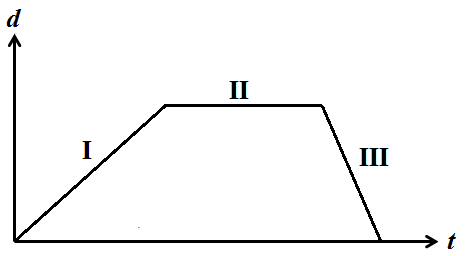 The object's acceleration is negative in region(s)
The object's acceleration is negative in region(s)
A) I.
B) II.
C) III.
D) no regions
 The object's acceleration is negative in region(s)
The object's acceleration is negative in region(s)A) I.
B) II.
C) III.
D) no regions

Unlock Deck
Unlock for access to all 143 flashcards in this deck.
Unlock Deck
k this deck
68
The figure shows the distance versus time graph of an object. 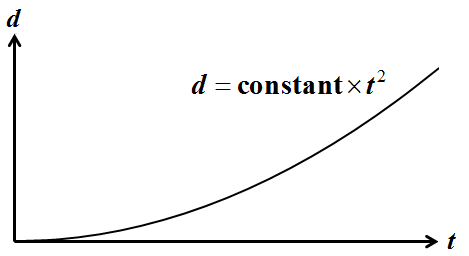 The acceleration of the moving object is
The acceleration of the moving object is
A) zero.
B) constant.
C) increasing.
D) decreasing.
E) not determinable.
 The acceleration of the moving object is
The acceleration of the moving object isA) zero.
B) constant.
C) increasing.
D) decreasing.
E) not determinable.

Unlock Deck
Unlock for access to all 143 flashcards in this deck.
Unlock Deck
k this deck
69
The figure shows a distance vs. time graph of an object with three distinct regions, I, II, and III. 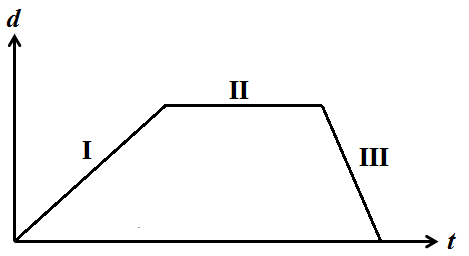 The object's velocity is positive in region(s)
The object's velocity is positive in region(s)
A) I.
B) II.
C) III.
D) no regions
 The object's velocity is positive in region(s)
The object's velocity is positive in region(s)A) I.
B) II.
C) III.
D) no regions

Unlock Deck
Unlock for access to all 143 flashcards in this deck.
Unlock Deck
k this deck
70
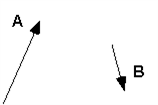
The sum of vectors A and B is
A)

B)

C)

D)


Unlock Deck
Unlock for access to all 143 flashcards in this deck.
Unlock Deck
k this deck
71
The figure shows the distance versus time graph of an object. 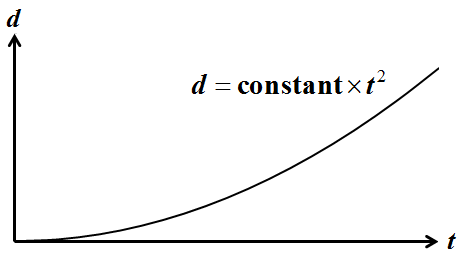 The velocity of the moving object is
The velocity of the moving object is
A) zero.
B) constant.
C) increasing.
D) decreasing.
E) not determinable.
 The velocity of the moving object is
The velocity of the moving object isA) zero.
B) constant.
C) increasing.
D) decreasing.
E) not determinable.

Unlock Deck
Unlock for access to all 143 flashcards in this deck.
Unlock Deck
k this deck
72
Motion in a circle at constant speed is motion with
A) constant acceleration.
B) constant velocity.
C) both of the above
D) none of the above
A) constant acceleration.
B) constant velocity.
C) both of the above
D) none of the above

Unlock Deck
Unlock for access to all 143 flashcards in this deck.
Unlock Deck
k this deck
73
Instantaneous speed and average speed are equal
A) always.
B) for motion at constant speed.
C) for accelerated motion.
D) never.
A) always.
B) for motion at constant speed.
C) for accelerated motion.
D) never.

Unlock Deck
Unlock for access to all 143 flashcards in this deck.
Unlock Deck
k this deck
74
The figure shows a distance vs. time graph of an object with three distinct regions, I, II, and III. 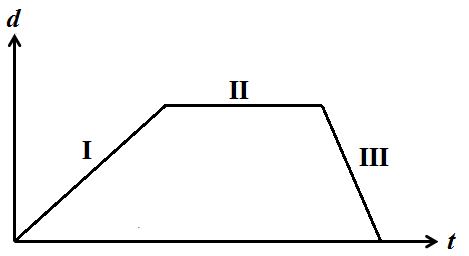 The object is at rest in region(s)
The object is at rest in region(s)
A) I.
B) II.
C) III.
D) no regions
 The object is at rest in region(s)
The object is at rest in region(s)A) I.
B) II.
C) III.
D) no regions

Unlock Deck
Unlock for access to all 143 flashcards in this deck.
Unlock Deck
k this deck
75
What is the period of a signal that has a frequency of 60 Hz?
A) 60 s
B) 60 s¯1
C) 1/60 s
D) not determinable
A) 60 s
B) 60 s¯1
C) 1/60 s
D) not determinable

Unlock Deck
Unlock for access to all 143 flashcards in this deck.
Unlock Deck
k this deck
76
The figure shows a distance versus time graph for an object. 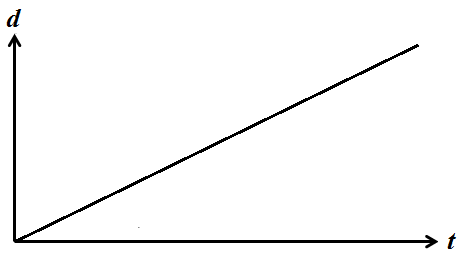 The acceleration of the moving object is
The acceleration of the moving object is
A) zero.
B) constant.
C) increasing.
D) decreasing.
E) not determinable.
 The acceleration of the moving object is
The acceleration of the moving object isA) zero.
B) constant.
C) increasing.
D) decreasing.
E) not determinable.

Unlock Deck
Unlock for access to all 143 flashcards in this deck.
Unlock Deck
k this deck
77
The slope of a velocity vs. time graph is the
A) distance.
B) velocity.
C) acceleration.
D) none of the above
A) distance.
B) velocity.
C) acceleration.
D) none of the above

Unlock Deck
Unlock for access to all 143 flashcards in this deck.
Unlock Deck
k this deck
78
A body at the end of a spring oscillates up and down ten times in five seconds. The period of oscillation is
A) 0.5 s.
B) 2 s.
C) 5 s.
D) 10 s.
E) not determinable.
A) 0.5 s.
B) 2 s.
C) 5 s.
D) 10 s.
E) not determinable.

Unlock Deck
Unlock for access to all 143 flashcards in this deck.
Unlock Deck
k this deck
79
The figure shows a distance vs. time graph of an object with three distinct regions, I, II, and III. 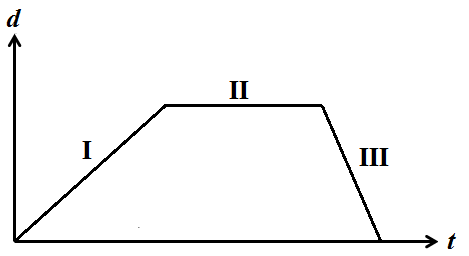 The object's velocity is negative in region(s)
The object's velocity is negative in region(s)
A) I.
B) II.
C) III.
D) no regions
 The object's velocity is negative in region(s)
The object's velocity is negative in region(s)A) I.
B) II.
C) III.
D) no regions

Unlock Deck
Unlock for access to all 143 flashcards in this deck.
Unlock Deck
k this deck
80
GPS stands for
A) the metric system of measurement.
B) grams per second.
C) Global Positioning System.
D) a space shuttle.
E) none of the above.
A) the metric system of measurement.
B) grams per second.
C) Global Positioning System.
D) a space shuttle.
E) none of the above.

Unlock Deck
Unlock for access to all 143 flashcards in this deck.
Unlock Deck
k this deck


